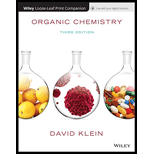
(a)
Interpretation:
To predict the major product in the given set of reactions and propose a mechanism for the same.
Concept introduction:
Under acid catalyzed conditions the carbonyl group gets protonated and gives a resonance stabilized intermediate resulting in formation of enol by deprotonation. The enol undergoes bromination to give an
(b)
Interpretation:
To predict the major product in the given set of reactions and propose a mechanism for the same.
Concept introduction:
Under acid catalyzed conditions the carbonyl group gets protonated and gives a resonance stabilized intermediate resulting in formation of enol by deprotonation. The enol undergoes bromination to give an
(c)
Interpretation:
To predict the major product in the given set of reactions and propose a mechanism for the same.
Concept introduction:
Under acid catalyzed conditions the carbonyl group gets protonated and gives a resonance stabilized intermediate resulting in formation of enol by deprotonation. The enol undergoes bromination to give an
Want to see the full answer?
Check out a sample textbook solution
Chapter 21 Solutions
ORGANIC CHEMISTRY-PRINT COMPANION (LL)
 ChemistryChemistryISBN:9781305957404Author:Steven S. Zumdahl, Susan A. Zumdahl, Donald J. DeCostePublisher:Cengage Learning
ChemistryChemistryISBN:9781305957404Author:Steven S. Zumdahl, Susan A. Zumdahl, Donald J. DeCostePublisher:Cengage Learning ChemistryChemistryISBN:9781259911156Author:Raymond Chang Dr., Jason Overby ProfessorPublisher:McGraw-Hill Education
ChemistryChemistryISBN:9781259911156Author:Raymond Chang Dr., Jason Overby ProfessorPublisher:McGraw-Hill Education Principles of Instrumental AnalysisChemistryISBN:9781305577213Author:Douglas A. Skoog, F. James Holler, Stanley R. CrouchPublisher:Cengage Learning
Principles of Instrumental AnalysisChemistryISBN:9781305577213Author:Douglas A. Skoog, F. James Holler, Stanley R. CrouchPublisher:Cengage Learning Organic ChemistryChemistryISBN:9780078021558Author:Janice Gorzynski Smith Dr.Publisher:McGraw-Hill Education
Organic ChemistryChemistryISBN:9780078021558Author:Janice Gorzynski Smith Dr.Publisher:McGraw-Hill Education Chemistry: Principles and ReactionsChemistryISBN:9781305079373Author:William L. Masterton, Cecile N. HurleyPublisher:Cengage Learning
Chemistry: Principles and ReactionsChemistryISBN:9781305079373Author:William L. Masterton, Cecile N. HurleyPublisher:Cengage Learning Elementary Principles of Chemical Processes, Bind...ChemistryISBN:9781118431221Author:Richard M. Felder, Ronald W. Rousseau, Lisa G. BullardPublisher:WILEY
Elementary Principles of Chemical Processes, Bind...ChemistryISBN:9781118431221Author:Richard M. Felder, Ronald W. Rousseau, Lisa G. BullardPublisher:WILEY





